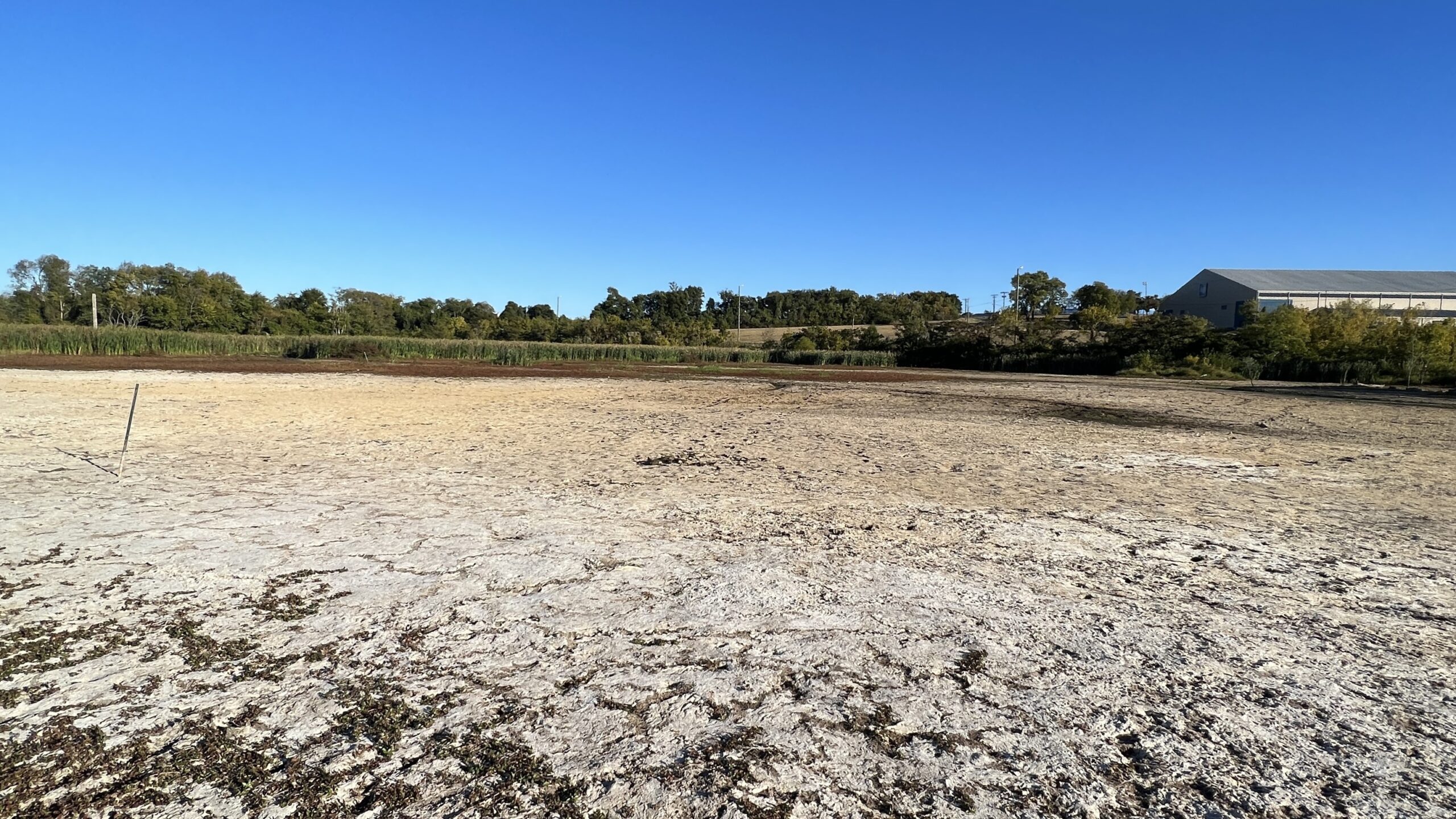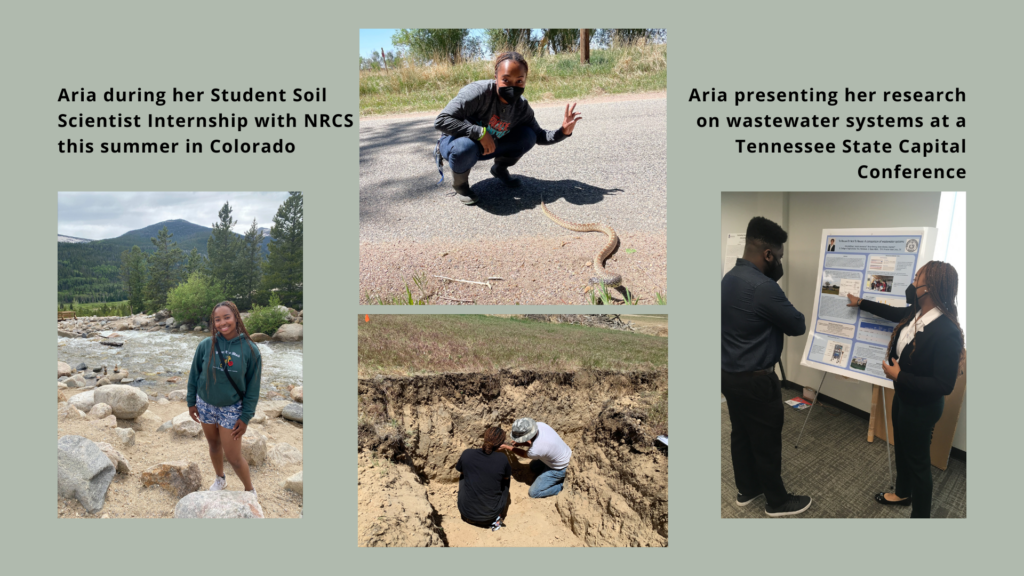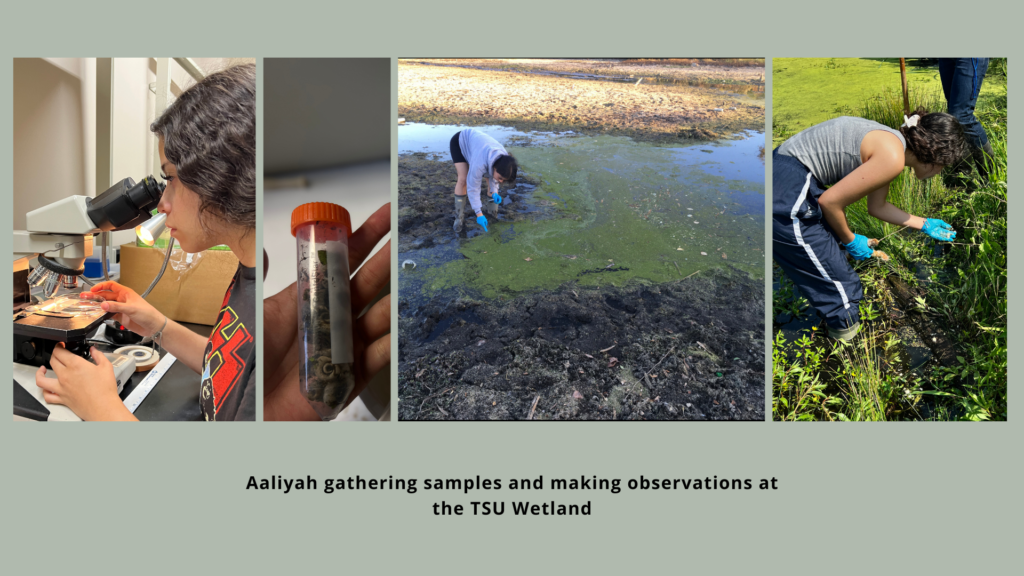SE CASC Project Inspires Students to Pursue Environmental Science Careers

SE CASC Researchers Tom Byl (USGS/TSU) and Champagne Cunningham (USGS/TSU), working with Harmful Algal Blooms and Climate Change, have been able to create a unique learning environment for students at Tennessee State University (TSU). Utilizing the Summer Bridge Program and Dean’s Scholars Program at TSU, they have been able to incorporate and expand research for the SE CASC project, Clarifying Science Needs for Determining the Impact of Climate Change on Harmful Algal Blooms in the Southeastern United States. Learn more about Byl and Cunningham’s contributions here.
When asked about students’ experiences with the Summer Bridge Program & working in Byl’s lab, two students stood out to Cunningham and Byl, Aria McElroy and Aaliyah Cotton.
Aria McElroy
McElroy is a junior majoring in agricultural science with a concentration in environmental science at Tennessee State University. She is part of the Dean’s Scholars Program where she conducts research alongside professors.
McElroy participated in the Summer Bridge Program as an incoming freshman during the height of the COVID-19 pandemic. The experience allowed her to connect with professors from the College of Agriculture about projects they were working on and different areas of study within environmental science, including Byl and the research he is conducting on Harmful Algal Blooms.
During her freshman year, McElroy was paired with Byl by the Dean’s scholars program where she learned about harmful algal blooms and conducted research on water quality and communities of color. She was heavily influenced by the Flint Water Crisis in Flint, Michigan and how minority communities are disproportionately affected by water quality issues.
Her research on water quality during her time in Byl’s lab led her to present at the 2021 Meeting of the Tennessee Academy of Science and then at other conferences in 2022. Having Byl as a professor and serving as a member of his lab gave McElroy a better sense of what she could do with an environmental science degree. Byl often brings Scientists from the USGS or USDA to talk to his classes about career paths, how to get into federal agencies, and different areas of research.
“He really tries to teach his students the science but then also gives them other opportunities beyond that,” added McElroy.

This past summer, McElroy was in Colorado working with the Natural Resource Conservation Service where she got hands-on experience working on different soil quality issues. For McElroy, the experience was especially meaningful because it showed her how everything in environmental science is connected, “for the farmers we worked with, soil health is important for them to be able to produce quality crops. Healthy ground cover helps to reduce temperature in the soil which helps to reduce the stress on the plants so they can grow better and more nutritiously.” Similarly, “learning about water quality and wastewater treatment is so important and integral to how we live our lives” and impacts the standard of living individuals have within a community.
While working in Colorado, McElroy decided to apply for the National Park Trust’s College Ambassador Program. The program provides college students with the resources to lead outdoor recreation participation and stewardship initiatives within their campus communities.
Byl’s connection to Mammoth Cave National Park, and the partnership between TSU and the park, provided McElroy with a potential host for outdoor programs. Cunningham provided further assistance in finalizing the application. Byl and Cunningham’s expertise and knowledge about different parks around campus as well as their experience with fishing and camping allowed McElroy to make sure that the application was the best that it could be. At the end of July, McElroy was selected to be the 2022-2023 National Park Trust College Ambassador and received a stipend from the Park Trust and HBCUs Outside.
This November, McElroy will be leading her first program with the grant at Mammoth Cave National Park. She will be leading a two-day camping trip where students will participate in a historical tour of the African American graveyards and other historical sites as well as learn about water resources surrounding the area. When asked about what she hopes students gain from her programs, McElroy wants students to realize that, “being outside is a lot of fun and you can walk away with a new skill that you may not have had before.”
Aaliyah Cotton
Another student who is currently working with Byl is Aaliyah Cotton. Cotton is a freshman majoring in agricultural science with a concentration in environmental science and is also in the Dean’s Scholars Program. She is currently working in Byl’s lab monitoring harmful algal blooms in the TSU wetland.
Cotton started working with Cunningham and Byl this past summer as a participant in the Summer Bridge Program. For three weeks Cotton, along with other incoming freshmen, connected with professors from various fields of environmental science and was able to join them in the field. At the TSU wetland, Byl talked about what they are currently seeing and introduced concerns about toxic algae. They took water, soil, and snail samples to test for the presence of toxic algae to see if that could be causing an increase in snail deaths. “What I really appreciate about Dr. Byl the most is that he let us be curious and let us look at it as an investigation,” said Cotton about the experience.
When Cotton returned to TSU in the fall she was partnered with Byl’s lab through the Dean’s Scholars Program. They are continuing to monitor the wetland especially with the current drought facing the area. “We just kind of know there’s going to be another outbreak when the water comes back, because it’s going to come back gradually, and given that everything’s dried up, we know it’s going to rehydrate and cause a problem,” possibly providing ideal conditions for toxic algae, said Cotton when asked about their current observations. Along with Byl, Cotton has collected soil core samples from the wetland to trace harmful algal blooms, going back to about 2012, where they hope to determine which years contained harmful algal blooms.

One thing that has surprised Cotton as she’s gotten to conduct this research is how harmful algal blooms can affect an entire ecosystem and food chain from snails and mussels, to fish, turtles, and plants.
“I’m glad I got to see the wetland when the water levels were normal in the summer and then come back in the fall and see the drought, that was insane to me” said Cotton about how the wetland has changed in just a few short months.
Her time with Byl and Cunningham has allowed Cotton to observe many different aspects of environmental science and get first-hand experience with critical issues like harmful algal blooms and climate change. “It’s really nice to see another young woman of color, passionate about science, involved in science. She’ll go out and get her hands dirty and do some meaningful work” said Cunningham about her experience mentoring Cotton.
On November 18, Cotton presented a poster at the 132nd Meeting of the Tennessee Academy of Science at Tennessee State University for her research on algal toxins in sediments. Her poster, “Accumulation of algal toxins in the Tennessee State University Wetland, Nashville, TN,” won first place, a great achievement for a freshman.

Cotton looks forward to continuing her work in Byl’s lab and learning more about the different avenues of environmental science. Something that drew Cotton to environmental science and motivates her to continue in the field is thinking about how to “leave a space better than how you found it and being aware of how you care for the environment for the people that come after you, because this is what the people that came before me did, and I feel like this route really allows me to do that.”
The accomplishments of Aria McElroy and Aaliyah Cotton highlight some of the ways that SE CASC project funding is leveraged to cultivate the next generation of scientists.
- Categories:
